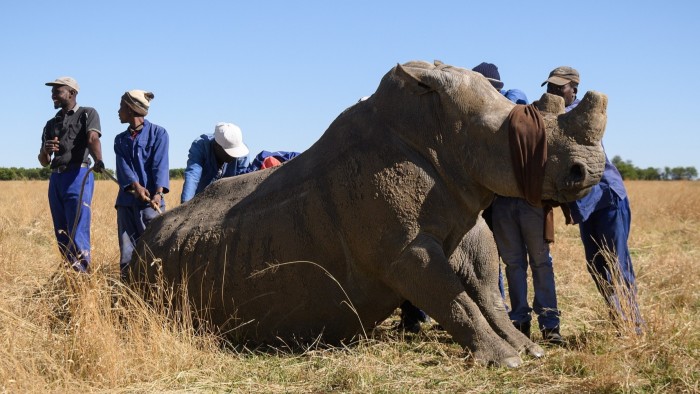The arrest in South Africa this week of an 83-year-old former property developer on charges of allegedly selling a huge haul of rhinoceros horns has divided conservationists in the country, which is home to about two-thirds of the world’s rhinos.
While some celebrated the successful “bust” of an alleged smuggling syndicate, others lamented that an experiment to decriminalise the trade in rhino horn had ended in court.
John Hume, who gained fame as South Africa’s “rhino baron” after he acquired and bred the world’s largest private herd of 2,000 rhinos, has denied allegations that he sold hundreds of rhino horns illegally to buyers in Asia.
He said this week he had “nothing to hide” after he was charged with being part of a smuggling syndicate that allegedly sold 964 horns worth roughly $14mn between 2017 and 2024. He has been co-operating with investigators for years, he said.
Hume was released on bail of R100,000 ($5,730) on Tuesday after appearing, alongside five co-defendants, at a magistrate’s court in Pretoria, the capital.
“The Hume case is a pivotal moment, one that may have significant ramifications for private rhino ownership and the future of any legalisation efforts,” said Annette Hübschle, a criminologist at Cape Town university’s Global Risk Governance Programme.
 John Hume, left, appears alongside five co-defendants at a magistrate’s court in Pretoria on Tuesday © Deaan Vivier/Beeld/Gallo Images/Getty Images
John Hume, left, appears alongside five co-defendants at a magistrate’s court in Pretoria on Tuesday © Deaan Vivier/Beeld/Gallo Images/Getty Images
Dion George, environment minister, praised the seven-year investigation by a specialised police unit known as the “Hawks”, saying authorities would “not hesitate to pursue those who plunder our wildlife for criminal profit”.
But some environmentalists, many speaking on condition of anonymity, said they regretted the end of an experiment in which Hume had campaigned for the legalisation of the rhino horn trade as a strategy to increase profits for conservationists and decrease them for criminal gangs.
“I feel rather sorry for Hume,” one conservationist sympathetic to the arguments for legalisation said. “He spent hundreds of millions of rand breeding and protecting 2,000 rhinos, which will now restock game reserves around Africa — and never saw any benefit.”
From the late 1990s, Hume started building up his herd of mainly white rhinos, some bred in captivity on a vast ranch near Klerksdorp, about 170km south-west of Johannesburg. He campaigned unsuccessfully for the legalisation of the trade in rhino horn, a potential change in international law that could have netted him millions of dollars in legal income.
Hume and the five others, including two attorneys and a former ranch manager, collectively face more than 50 charges of theft, fraud and money laundering and racketeering.
Hanno Nusch, executive director of Rhino Revolution, an non-governmental organisation based in Hoedspruit, said he supported the decriminalisation of the rhino horn trade.
“Turning an illegal product into a legal, ethical revenue stream benefits, not exploits, the rhino and the people who protect them,” he said.
Rhino horn, which can be trimmed without harming the animal, grows back, Nusch said, whereas a poacher could only obtain horn by killing the animal.
Rhino horn prices fluctuate significantly but can fetch $60,000 a kilo on the black market, according to estimates. Horns typically weigh between 1.5 kilogrammes and 4 kilogrammes each.
Despite Hume’s efforts, the international trade remains banned under the Convention on International Trade in Endangered Species. While horns can be bought and sold legally in South Africa provided permits are granted, Hume and his co-defendants are accused of obtaining domestic permits as a ruse to sell internationally — something he denies.
Hume ran into financial difficulties as he faced the huge cost of feeding the animals, which can weigh more than two tonnes.
In 2023, he tried to auction the ranch and all its rhinos for $10mn but received no bids. Rhinos are worth little or nothing alive, even to game parks, because prospective owners have to spend enormous sums on rangers and technology to prevent them being poached.
Hume’s rhino ranch was eventually taken over by African Parks, a Johannesburg-based conservation NGO that has started relocating them to game parks in South Africa and Rwanda, with other countries to follow.
Many reserves and parks that keep rhinos, including Kruger National Park, regularly trim horns as a way of reducing their attractiveness to poachers. Shaving the horn is a complex — and expensive — operation involving helicopters and veterinarians skilled in darting and sedating the animals with a cocktail of drugs.
In the past 15 years, more than 10,000 rhinos have been killed in South Africa by poachers, according to Save the Rhino, an NGO. The number of poached rhinos has halved since 2019, according to the environment ministry, with about 420 killed in 2024.
Rhino horn is prized in China, Vietnam and other parts of south-east Asia, where it is considered to have medical properties and is viewed as a status symbol.
Ted Reilly, a legendary conservationist in Eswatini, a country surrounded by South Africa, said he strongly favoured decriminalisation. He previously bought 16 of Hume’s black rhinos as a means of shoring up the severely depleted population in Eswatini, formerly Swaziland. Speaking before Hume’s arrest, Reilly said he supported what the businessman was trying to do.
Under current laws, Reilly said, poachers earned all the profits from rhinos while “custodians” such as him bore all the costs. If custodians could shave and sell horn, he said, it would become attractive to own rhinos and plough some of the profit back into conservation.
“To save our rhinos we simply have to try to outcompete the illegal trade with legal trade in rhino horn,” he said.

